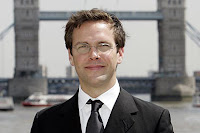 Malcolm Law
Malcolm Law, Professor of Epidemiology and
Sir Nicholas Wald, Professor of Environmental and Preventive Medicine, at the Centre for Environmental and Preventive Medicine, Wolfson Institute of Preventive Medicine, Barts and The London School of Medicine, hold patents (granted and pending) on the formulation of a combined pill (polypill) to simultaneously reduce four cardiovascular risk factors - low density lipoprotein cholesterol, blood pressure, serum homocysteine, and platelet function.
They argue that the motivation for the patent for the Polypill is to help ensure its development and to fund the necessary clinical trials, which are costly. According to the
Independent, they have had talks with the Government's Heart Czar, Roger Boyle, and the Medicines and Healthcare products Regulatory Agency (MHRA) about obtaining a licence. Progress has been held up by a lack of funding and charitable foundations are being approached for support. I think the argument will have been that the NHS should pay for the necessary trials.
Keep up to date with the
Polypill news blogspot. The blogger,
Shaun Holt, is an enthusiast for the pill, not least because he's launched the polypack, which packages the polypill medicines into daily sachets. "The benefits are massive," Holt argues. He admits the polypill is several years away if it is going to produce data on mortality and morbidity, as the estimates of reduction in cardiovascular risk are predictions and projections. There's probably no money in it for drug companies as the drugs are off patent.
Other people are also enthusiasts, such as Richard Smith, the ex-editor of the BMJ, who takes the 5 pills every night. The BMJ has this week published an
article by Law and Wald said to be providing evidence that everyone over 55 should take medication to reduce blood pressure. They should get their money out of the patent eventually.
 Dr Foster believes itself to be the leading provider of comparative information on health and social care services. It's latest hospital guide has caused controversy.
Dr Foster believes itself to be the leading provider of comparative information on health and social care services. It's latest hospital guide has caused controversy. 











































